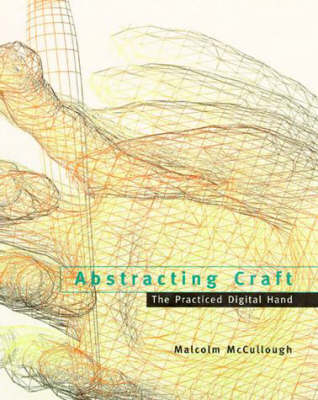
Abstracting Craft
The Practiced Digital Hand
Seiten
1997
MIT Press (Verlag)
978-0-262-13326-5 (ISBN)
MIT Press (Verlag)
978-0-262-13326-5 (ISBN)
- Titel ist leider vergriffen;
keine Neuauflage - Artikel merken
In this investigation of the possibility of craft in the digital realm, the author discusses the emergence of computation as a medium, rather than just a set of tools, suggesting a growing correspondence between digital work and traditional craft.
The love of making things need not be confined to the physical world - electronic form giving can also be a rewarding hands-on experience. In this investigation of the possibility of craft in the digital realm, Malcolm McCullough observes that the emergence of computation as a medium, rather than just as a set of tools, suggests a growing correspondence between digital work and traditional craft. With examples and illustrations drawn from a variety of disciplines, "Abstracting Craft" shows that anyone who gives form with software, whether in architecture, painting, animating, modelling, simulating or manufacturing, is practising personal knowledge and producing visual artifacts that, although not material, are nevertheless products of the hands, eyes and mind. Chapter by chapter, McCullough builds a case for upholding humane traits and values during the formative stages of new practices in digital media.
He covers the nature of hand-eye coordination; the working context of the image culture; aspects of tool usage and medium appreciation; uses and limitations of symbolic methods, issues in human-computer interaction; geometric constructions and abstract methods in design; the necessity of improvization; and the personal worth of work. For those new to computing, McCullough offers an inside view of what the technology is like, what the important technical issues are, and how creative computing fits within a larger intellectual history. Specialists in human-computer interactions should find an interesting case study of the anthropological and psychological issues that matter to designers. Artificial intelligence researchers should be reminded that much activity fails to fit articulable formalisms. Aesthetic theorists should find a curiously developed case of neostructuralism, and cultural critics should be asked to imagine a praxis in which technology no longer represents an authoritarian opposition. Finally, the unheralded legions of digital craftspersons should find an acknowledgement of their artistry and humanity.
The love of making things need not be confined to the physical world - electronic form giving can also be a rewarding hands-on experience. In this investigation of the possibility of craft in the digital realm, Malcolm McCullough observes that the emergence of computation as a medium, rather than just as a set of tools, suggests a growing correspondence between digital work and traditional craft. With examples and illustrations drawn from a variety of disciplines, "Abstracting Craft" shows that anyone who gives form with software, whether in architecture, painting, animating, modelling, simulating or manufacturing, is practising personal knowledge and producing visual artifacts that, although not material, are nevertheless products of the hands, eyes and mind. Chapter by chapter, McCullough builds a case for upholding humane traits and values during the formative stages of new practices in digital media.
He covers the nature of hand-eye coordination; the working context of the image culture; aspects of tool usage and medium appreciation; uses and limitations of symbolic methods, issues in human-computer interaction; geometric constructions and abstract methods in design; the necessity of improvization; and the personal worth of work. For those new to computing, McCullough offers an inside view of what the technology is like, what the important technical issues are, and how creative computing fits within a larger intellectual history. Specialists in human-computer interactions should find an interesting case study of the anthropological and psychological issues that matter to designers. Artificial intelligence researchers should be reminded that much activity fails to fit articulable formalisms. Aesthetic theorists should find a curiously developed case of neostructuralism, and cultural critics should be asked to imagine a praxis in which technology no longer represents an authoritarian opposition. Finally, the unheralded legions of digital craftspersons should find an acknowledgement of their artistry and humanity.
| Erscheint lt. Verlag | 30.4.1997 |
|---|---|
| Zusatzinfo | 63 |
| Verlagsort | Cambridge, Mass. |
| Sprache | englisch |
| Maße | 160 x 223 mm |
| Gewicht | 794 g |
| Themenwelt | Mathematik / Informatik ► Informatik ► Grafik / Design |
| Informatik ► Software Entwicklung ► User Interfaces (HCI) | |
| Sozialwissenschaften | |
| ISBN-10 | 0-262-13326-1 / 0262133261 |
| ISBN-13 | 978-0-262-13326-5 / 9780262133265 |
| Zustand | Neuware |
| Haben Sie eine Frage zum Produkt? |
Mehr entdecken
aus dem Bereich
aus dem Bereich
Lean UX und Design Thinking: Teambasierte Entwicklung …
Buch | Hardcover (2022)
dpunkt (Verlag)
CHF 48,85
Aus- und Weiterbildung nach iSAQB-Standard zum Certified Professional …
Buch | Hardcover (2023)
dpunkt Verlag
CHF 48,85
Wissensverarbeitung - Neuronale Netze
Buch | Hardcover (2023)
Carl Hanser (Verlag)
CHF 48,95


